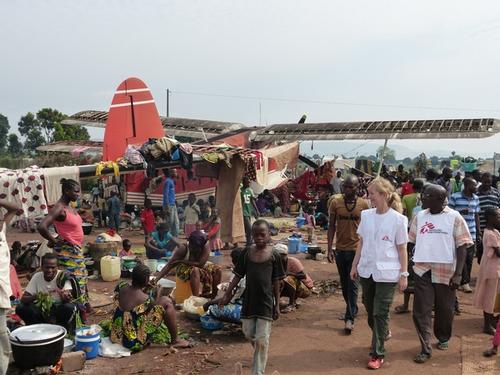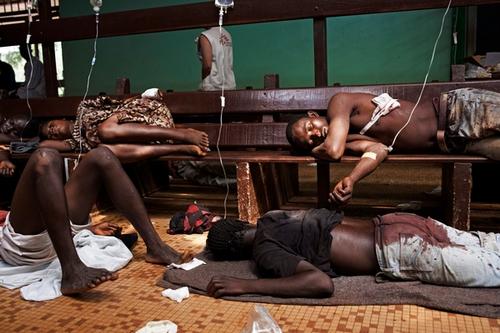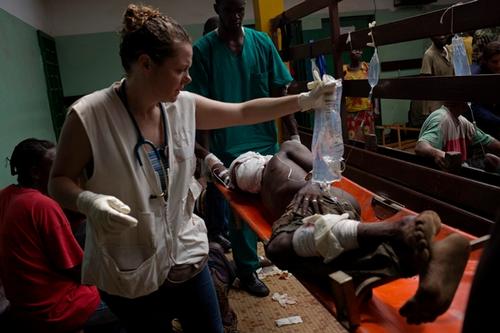
The mobile emergency team of Médecins Sans Frontières (MSF) is providing round-the-clock medical care at Bangui airport, Central African Republic, following an outbreak of violence that has swept through the capital since 5 December. MSF’s airport clinic is addressing the medical needs of more than 40,000 displaced people who have sought refuge at the airport.
Deplorable sanitary conditions
“It’s a very difficult situation. Sanitary conditions are deplorable and people are living in fear” said Rosa Crestani, MSF’s emergency coordinator in Bangui. “Having fled their homes, they are now seeking shelter underneath airplane wings or wherever else they can find it”.
MSF is carrying out over 200 consultations per day at the airport, primarily providing dressing for wounds, abscesses and burns and treating respiratory tract infections and malaria, but also providing referrals of medical and surgical emergencies to hospital structures in the city, such as the Castor Maternity, the Community Hospital or the Pediatric Complex in Bangui. MSF has also assisted in the delivery of several babies.
Addressing unfulfilled medical needs
MSF is striving to address currently unfulfilled medical needs, such as treatment for chronic diseases and TB. But tensions within the airport camp are on the rise due to other unfulfilled needs.
On Thursday 12 December MSF said in an open letter addressed to Valérie Amos, the United Nations Under-Secretary-General for Humanitarian Affairs, that UN organisations have failed to deliver an adequate response to the gravity and the scale of humanitarian needs on the ground. Organisations such as ICRC and the CAR Red Cross have started to provide water and sanitation services, but needs are far from covered.
Untenable situation
“Although MSF is able to provide medical support, many other needs remain unfulfilled such as food, shelter and protection.” said Crestani. “Water and sanitation is a disaster, and the risk of further disease is high as a result. This situation is untenable.”
MSF’s mobile emergency team has also started to support medical activities in the Boy Rabe monastery, where an additional 10,000 displaced people have sought refuge. On 11 and 12 December - the first two days of activities at this location - MSF carried out 231 consultations and provided dressing for 31 wounded. In addition, MSF also provides medical care, hospital referrals and water and sanitation activities at the Don Bosco camp, where more then 13,000 displaced people are residing.
MSF has been present in CAR since 1997. MSF is currently managing seven regular projects (in Batangafo, Boguila, Carnot, Kabo, Ndéle, Paoua and Zémio) and four emergency projects (in Bangui, Bossangoa, Bouca and Bria). In addition, a mobile emergency team is covering the displaced camps of Bangui. By the end of the year, MSF hopes to start activities in the hospitals of Bangassou and Ouango. In total, it provides free medical care to nearly 400,000 people; through its work in 7 hospitals, two medical centres and 40 health posts; and has more than 100 expatriate personnel and approximately 1,100 local staff in its teams.





